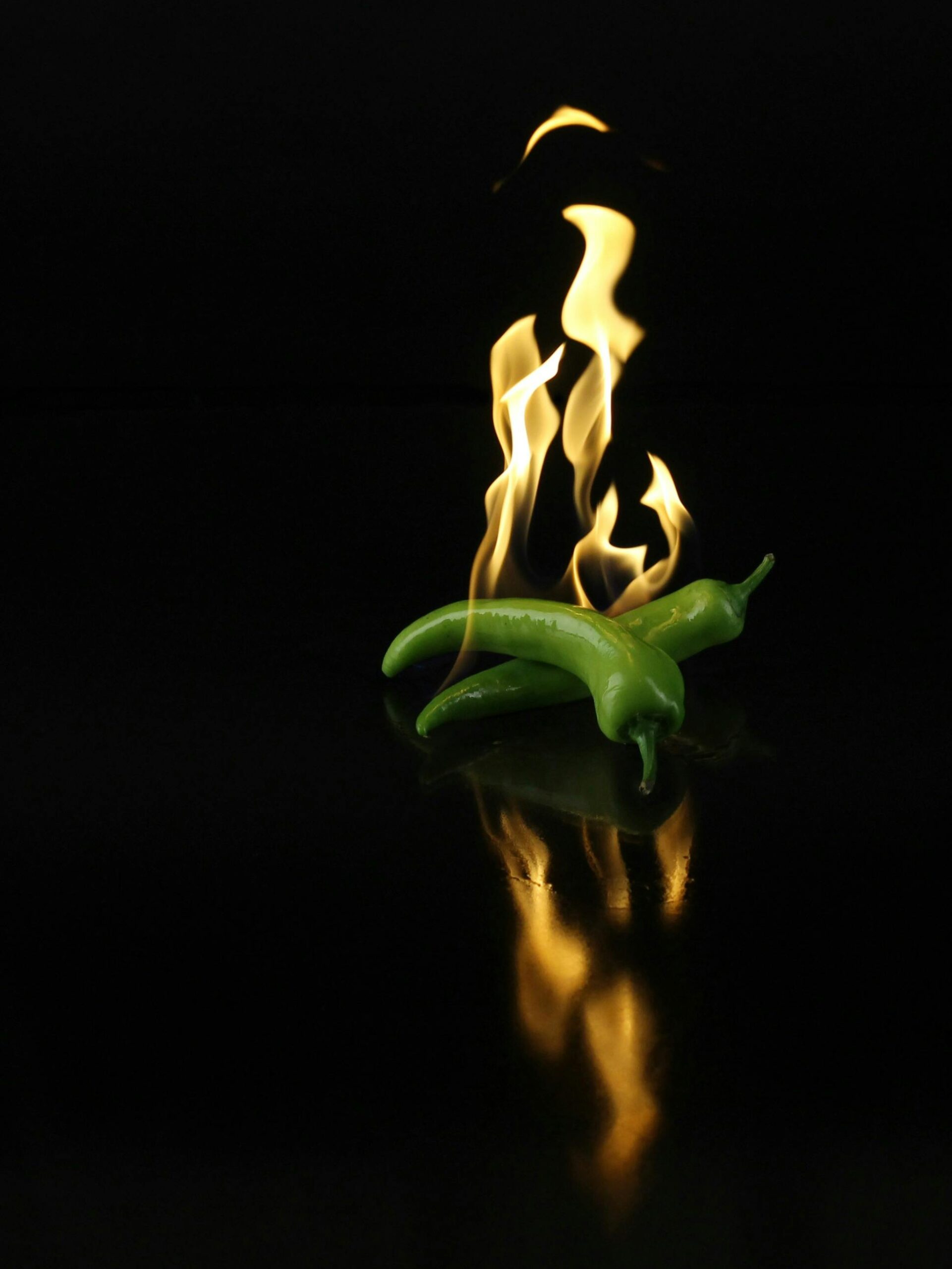In a world where culinary adventures are just a bite away, the quest for the perfect level of heat has become a tantalizing challenge for food lovers everywhere. From fiery hot wings to spicy curries, many are discovering the joys of chili peppers and their active compound, capsaicin. But what happens when the heat becomes too much to handle? Surprisingly, our bodies have a remarkable ability to adapt, allowing us to build a tolerance to spiciness over time.
The Heat is On
Chili peppers are not just a flavor enhancer; they pack a punch of health benefits, too. Research has shown that capsaicin can boost metabolism, improve cardiovascular health, and even provide pain relief. However, for those unaccustomed to the heat, the initial experience can be overwhelming. The burning sensation caused by capsaicin activates pain receptors in the mouth, leading many to shy away from spicy foods altogether.
But fear not! Science has revealed that with repeated exposure, our bodies can adapt to the heat. This phenomenon, known as desensitization, occurs when the TRPV1 receptors in our mouths become less responsive to capsaicin. Essentially, the more you eat spicy foods, the more your body learns to tolerate them.
A Journey of Flavor
Take, for example, the culinary traditions of countries like Mexico, India, and Thailand, where spicy foods are a staple. Individuals raised in these cultures often develop a higher tolerance for heat from a young age. A study published in the American Journal of Clinical Nutrition found that regular consumption of chili peppers is linked to a lower risk of cardiovascular disease, suggesting that those who embrace the heat may also enjoy long-term health benefits.
“Growing up in a household that loved spicy food, I learned to appreciate the flavors and the heat,” says Maria Gonzalez, a food blogger and spice enthusiast. “Now, I can handle dishes that would make most people sweat!”
The Science of Spice
Research has shown that the body’s response to capsaicin is not just about pain tolerance; it also involves neurochemical changes. When you eat spicy foods, your body releases endorphins, the natural painkillers that create a sense of euphoria. This “spicy high” can make the experience enjoyable, encouraging individuals to seek out even hotter dishes.
A study by researchers at the University of California found that individuals who regularly consume spicy foods report a more positive experience when eating them, reinforcing their desire to continue exploring the world of heat. “It’s like a rollercoaster ride for your taste buds,” says Dr. Emily Chen, a food scientist. “Once you get used to the initial shock, you start to crave that excitement.”
Tips for Building Your Spice Tolerance
For those looking to embark on their own spicy journey, here are some tips to gradually build tolerance:
- Start Slow: Begin with milder peppers, such as jalapeños, and gradually work your way up to hotter varieties like habaneros or ghost peppers.
- Pair with Dairy: Consuming dairy products like yogurt or milk can help neutralize the heat, making it easier to enjoy spicier dishes.
- Incorporate Spices Gradually: Add small amounts of chili powder or hot sauce to your meals and increase the quantity over time.
- Stay Consistent: Regularly include spicy foods in your diet to help your body adapt to the heat.
- Listen to Your Body: Pay attention to your reactions and adjust your spice levels accordingly. It’s all about finding your personal heat threshold.
Chili peppers, known for their heat, contain capsaicin, the active compound responsible for the sensation of spiciness. The ability to tolerate spiciness varies among individuals and can change with repeated exposure. This report reviews the current research on the physiological, neurological, cultural, and psychological factors that contribute to the development of tolerance to spiciness.
1. Physiological Mechanisms
1.1 Desensitization of TRPV1 Receptors
Capsaicin activates the TRPV1 (transient receptor potential vanilloid 1) receptors, which are responsible for detecting heat and pain. When capsaicin binds to these receptors, it sends signals to the brain that are interpreted as a burning sensation. Research by Caterina et al. (2000) demonstrated that repeated exposure to capsaicin leads to desensitization of TRPV1 receptors. This desensitization results in a reduced response to capsaicin over time, allowing individuals to tolerate higher levels of spiciness without discomfort.
1.2 Pain Threshold and Tolerance
Studies have shown that regular consumption of spicy foods can increase pain thresholds. Bachmanov et al. (2001) found that individuals who frequently consume spicy foods exhibit higher pain thresholds when exposed to capsaicin compared to those who do not. This suggests that habitual consumption can lead to an increased tolerance to the heat sensation, allowing individuals to enjoy spicier foods without experiencing the same level of discomfort.
2. Neurochemical Responses
2.1 Endorphin Release
Capsaicin consumption has been linked to the release of endorphins, which are natural pain-relieving chemicals produced by the body. Zhang et al. (2015) indicated that the consumption of capsaicin can stimulate endorphin release, leading to a pleasurable sensation often referred to as a “spicy high.” This positive reinforcement may encourage individuals to continue consuming spicy foods, further enhancing their tolerance.
3. Cultural and Dietary Influences
3.1 Cultural Exposure
Cultural factors play a significant role in the adaptation to spiciness. Research by López et al. (2017) highlighted that individuals from cultures where spicy foods are a dietary staple tend to have higher tolerance levels compared to those from cultures where spicy foods are less common. This suggests that early and frequent exposure to capsaicin can lead to greater tolerance, as individuals become accustomed to the heat associated with spicy foods.
4. Psychological Factors
4.1 Expectation and Experience
Psychological factors also influence the perception of spiciness and the development of tolerance. A study by Köster et al. (2015) found that individuals who enjoy spicy foods often report a more positive experience when consuming them. This positive association can lead to increased consumption of spicy foods, reinforcing the adaptation process and contributing to a higher tolerance over time.
Conclusion
The development of tolerance to spiciness is a multifaceted process influenced by physiological, neurological, cultural, and psychological factors. Repeated exposure to capsaicin leads to desensitization of TRPV1 receptors and increased pain thresholds, while neurochemical responses, such as endorphin release, contribute to the pleasurable experience of consuming spicy foods. Cultural habits and psychological factors further shape individual tolerance levels. Understanding these mechanisms can provide insights into dietary preferences and the enjoyment of spicy foods across different populations.
References
- Bachmanov, A. A., et al. (2001). Genetic and environmental determinants of the perception of capsaicin. Chemical Senses, 26(4), 389-396.
- Caterina, M. J., et al. (2000). The capsaicin receptor: a heat-activated ion channel in the pain pathway. Nature, 404(6779), 819-824.
- Köster, E. P., et al. (2015). The role of expectation in the perception of spiciness. Food Quality and Preference, 39, 1-8.
- López, A., et al. (2017). Cultural influences on the perception of spiciness: A study of Mexican and American participants. Appetite, 113, 1-8.
- Zhang, Y., et al. (2015). Capsaicin-induced endorphin release and its role in the perception of spiciness. Journal of Pain Research, 8, 1-8.
This report provides a comprehensive overview of the factors contributing to the development of tolerance to spiciness, highlighting the complex interplay between physiological responses, cultural influences, and psychological factors.








Leave a Reply